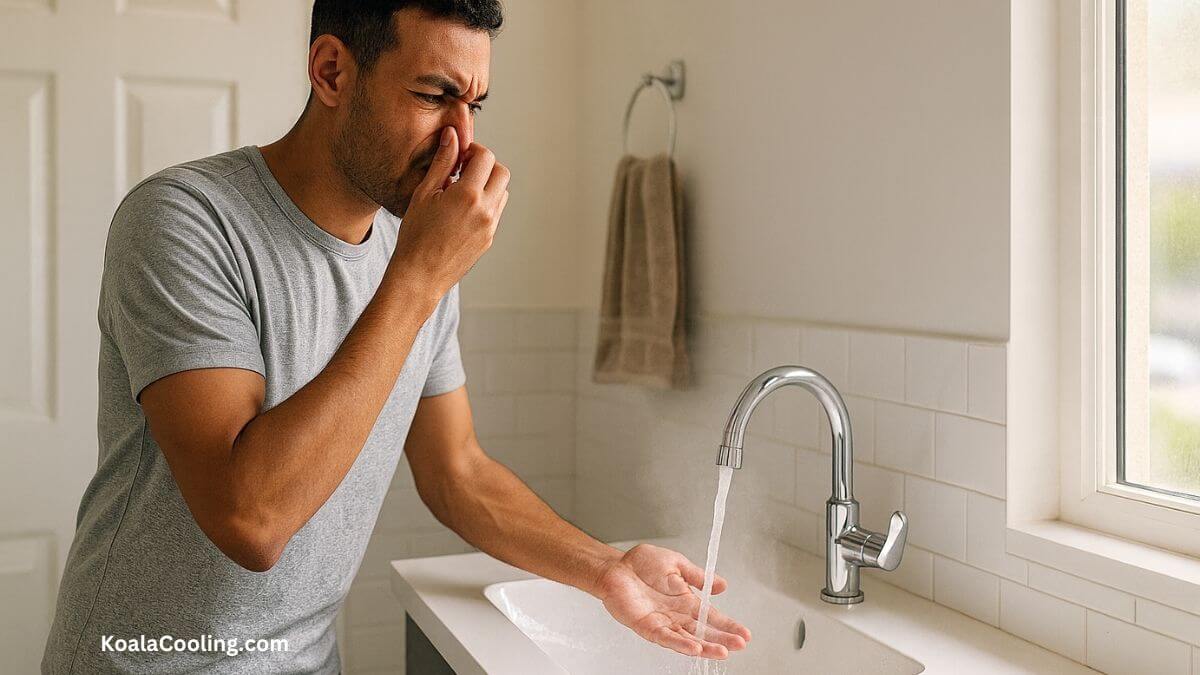Does your hot water smell like rotten eggs? You are not alone. This problem is common around Central Texas, and it is usually simple to solve. Use this guide to find the source, try safe first steps, and decide when to call Koala Cooling & Plumbing.

What Causes The Smell?
The rotten egg odor usually comes from a small amount of hydrogen sulfide gas in the hot water. It is not the same as a sewer smell from the drain. Inside most tank water heaters there is a metal rod called an anode that protects the steel tank from rust.
Many anodes are made of magnesium. In some water, magnesium can help create the smelly gas. Sediment in the tank, lower water temperatures, long breaks in use, and some water softeners can make the odor stronger. Tankless systems can also smell if scale builds up or water sits inside the unit. See Repair or replace for more on descaling and maintenance.
Find The Source
Pick one sink and fill a clean glass with cold water. Smell it, then fill a glass with hot water and smell again. If only the hot water smells, the water heater is the likely source.
Repeat the test at another faucet to confirm the pattern. If both hot and cold smell in several places, the problem may be the water coming into your home or the softener; you will likely need a whole‑home fix. To rule out a drain odor, smell the water in the glass away from the sink.
If a guest bathroom smells more than the kitchen, water may have been sitting in those pipes. Run that tap for a minute to refresh the line and note any changes.
Safety First
If the smell is very strong and anyone feels sick, step outside and call for help. Before you drain or open a water heater, turn off gas or electricity and let the water cool.
On gas models, set the control to vacation before service and relight only after the tank is full. On electric models, switch off the breaker so the heating elements do not run while the tank is empty.
If you raise the water temperature to sanitize the tank, warn everyone in the home and turn the setpoint back down afterward. See the mixing valve note in Fixes that last for safer hot‑water temps.
Many homes run at about 120°F. Water at 140°F cleans better but can cause burns.
Quick Fixes
Start by moving old water out of the tank and pipes. Run a hot faucet for a few minutes. Then attach a garden hose to the drain valve at the bottom of the heater and drain several gallons to a safe place.
If the smell fades after this, sediment and stale water were part of the problem. Clean the small screens in any faucets that smelled strong. You can also try a short sanitizing step.
Raise the tank to 140°F for two to three hours, then set it back down. Keep kids away from hot taps while the temperature is up.
If you have a softener: Switch it to bypass for a short test. If the smell changes, have the softener cleaned or adjusted. In some cases, it makes sense to install a new water softener.
These steps give quick answers without major work. If the odor returns soon, move on to lasting fixes.
Fixes That Last
If the smell returns, focus on the anode and on a deep clean of the tank. Replacing a magnesium anode with an aluminum‑zinc anode often reduces odor and still protects the tank.
A professional can also sanitize the tank and hot water lines with hydrogen peroxide or chlorine and then flush the system until the odor is gone.
A full drain and rinse will remove sediment that traps odor and slows heating.
Add a mixing valve: A thermostatic mixing valve lets the tank run hotter for hygiene while faucets still deliver safe water. If you want one, we can add one during our visit so future sanitizing is simple and scald risk stays low.
If both hot and cold water smell across the home, consider a filter that treats the water as it enters the house. This stops odor before it reaches the tank.
Join The Koala Club
The Koala Club includes a yearly flush (as long as the unit is less than 7 years old) and inspection (regardless of age) so sediment stays under control. The Koala Club includes other routine checks and reminders for both your plumbing system and your HVAC system, making it super easy to stay on top of this home maintenance.
Repair Or Replace
Repair is a good choice when the tank is in good shape and under eight to ten years old. An anode change and a sanitizing step often bring long relief, especially with a mixing valve.
Replacement makes sense if the tank leaks, is badly rusted, or is near the end of its life and the smell keeps coming back. If you install a new tank, ask about adding a mixing valve and a powered anode right away.
If you switch to tankless, odor is less common but still possible with scale and low use. A descaling service and a short sanitizing step usually fix it. Our yearly maintenance plan keeps it that way.
Need help deciding? If you’re in the Greater Austin area, schedule an inspection today!
Smelly hot water is fixable. Koala Cooling & Plumbing can find the cause, replace the anode, sanitize the tank and lines, add a mixing valve if needed, and set you up with a simple maintenance plan.
You will get clear recommendations and a written record of the work. Call or schedule online for friendly service in Austin, Round Rock, Georgetown, Pflugerville, Cedar Park, and nearby areas.
Common questions
It depends on the brand and the anode. We check your model and keep records for you.
Yes for most homes. If you have special water concerns, we can also discuss a powered anode that does not get used up.
Many last as long as the tank. If you’re a member of our Koala Club, we will check regularly.
Some owners do their own flushes. If you try it, turn off gas or power, work safely, and flush until the water is clear. Many people prefer a pro because it is faster and includes anode service.
Heavy scale, a softener setting, or a magnesium anode can bring the smell back. A powered or aluminum-zinc anode plus a deep clean usually solves it.
If an unused bathroom keeps smelling, run that tap weekly or ask about a small recirculation setup. Keeping water moving helps a lot.
The smell is unpleasant, but in most homes it is only a nuisance. Strong or sudden odors deserve caution.
If anyone feels sick, step outside and call for help, then get the system checked. We are happy to test and advise.
The serial number on the label often includes the date of manufacture. If you are not sure, we can decode it and advise you on repair or replacement.
